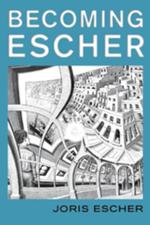In a nineteenth century Chinese lacquer box, Joris Escher finds two drawings of his great-uncle, the world-famous graphic artist M.C. Escher. The sheets haven’t seen the light in more than 90 years. He believes that these early studies may be the missing link in the development of Escher as an artist and starts a voyage of discovery to the origins of the fascinations of his great-uncle. Who was his Uncle Mauk? How did he become Escher? How did he, precisely he, begin walking down a path on which no one had preceded him and no one would ever follow? The reader is a witness – through the eyes of the artist – of Escher’s life-metamorphosis in four successive parts; his youth (Becoming Mauk), his art education as a young adult (Becoming a graphic artists), his happiest years in Italy (Becoming an artist) and finally, already in his late thirties, the transformation that leads to his spatial experiments (Becoming Escher). The transformation of the artist has been written in the form of a novel; but nonetheless always parting from the known facts of primary sources (letters, diaries, family albums). The mentioned parts about Escher’s artistic development are woven together by the chapters that are called ‘Ripples’, in which Joris Escher finds additional ways to bridge the gap of time between the reader and M.C. Escher. Joris learns to make woodcuts, thus he understands with his hands what his great-uncle did. He studies Mauk’s way of observing reality by finding and drawing on the spots in Italy and Spain where the artist made his drawings and finally he visits Escher’s eldest son in Canada. The ‘Ripples’ could be considered literary non-fiction. So in Becoming Escher non-fiction literature and literary non-fiction are locking into each other, as art and mathematics in Escher’s oeuvre.

Becoming escher
ISBN: 9781538190609
Format: Hardback
Publisher: Rowman & Littlefield
Origin: US
Release Date: December, 2024


